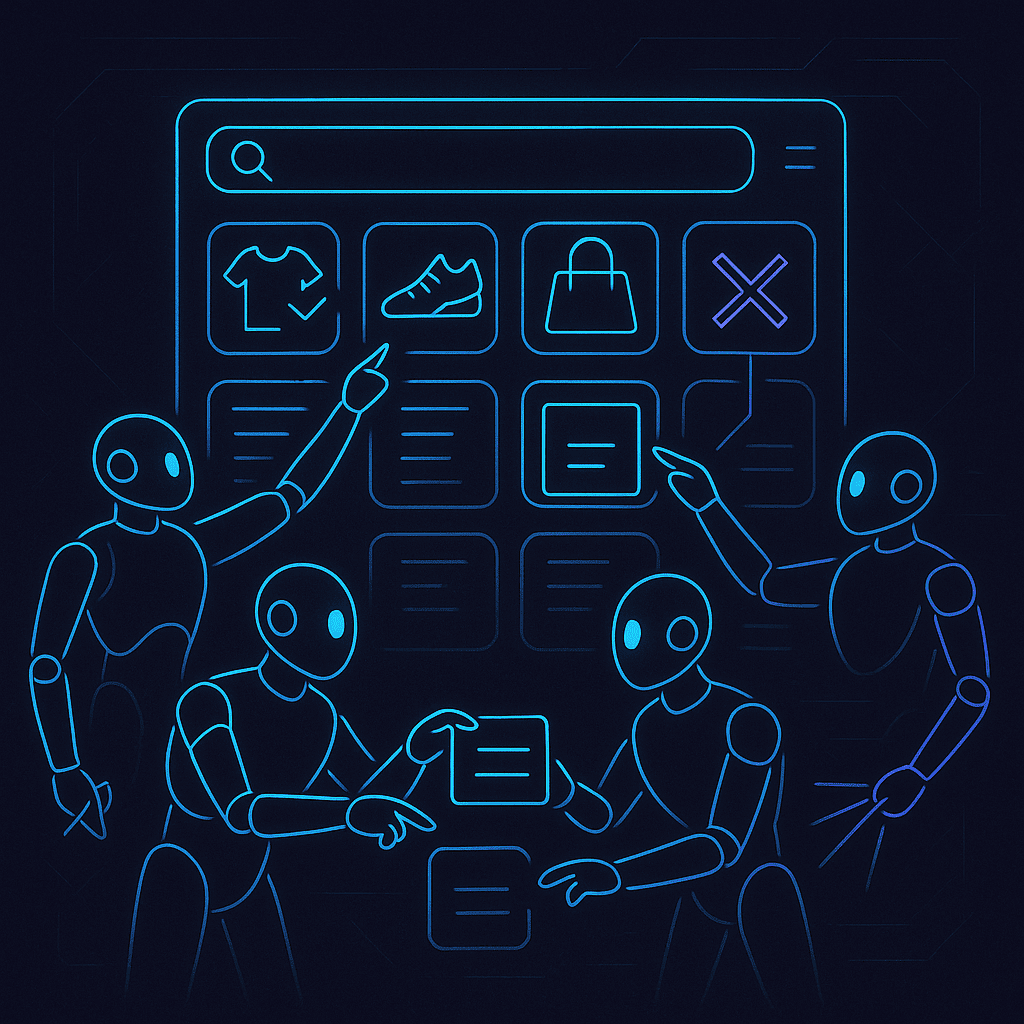What are AI Agents for Search Analysis?
AI agents for search operate on top of an existing search engine. Their tasks include:
- Checking whether results truly match the query
- Analyzing whether ranking reflects user intent
- Identifying gaps in assortment coverage
- Evaluating how well search fulfills user intent
Unlike classic search algorithms that rely solely on semantic matching, agents act as auditors. They assess not only literal keyword overlap but also semantic relevance and experience quality.
Examples of Agents and Their Roles
MatchMind — the relevance auditor
Ensures that product titles and descriptions match the user’s query.
Example: for “kids bed with storage drawers,” MatchMind excludes results such as “adult bed” or “kids bed without drawers.”
Benchmark: share of irrelevant results in the top 10. A strong benchmark is below 5%.
RankCheck — the ranking optimizer
Even when results are relevant, order matters.
Example: for “wireless headphones,” RankCheck detects if a charging accessory incorrectly appears above actual headphones.
Benchmark: CTR-weighted position of the most clicked item. Improvements of 15–20% are typical.
CoverageScan — the assortment guardian
Checks if key subcategories are represented in results.
Example: for “winter jackets,” CoverageScan verifies that men’s, women’s, and children’s models all appear.
Benchmark: SKU diversity above 80%.
IntentLens — the intent analyzer
Identifies what the customer really meant and audits whether the results align.
Example: “Scandinavian lamp” could imply a desk lamp or pendant lamp. IntentLens highlights if the results cover only one interpretation.
Benchmark: intent coverage of at least 70%.
Benchmarks from E-commerce Deployments
- According to Baymard Institute, up to 34% of e-commerce search sessions fail due to poor results.
- Retailers using AI agents to audit search see 20–30% fewer zero-result sessions.
- Conversion rates from search increase by 15–25%, while bounce rates drop by 18%.
- Manual QA time for search is reduced by a factor of 5–7.
These numbers confirm that automated auditing agents are not just an innovation but a measurable driver of revenue.
Why This Matters
- Scalable quality control. In catalogs with millions of SKUs, manual checks are impossible. AI agents automate the process.
- Actionable metrics. Instead of vague complaints, teams get concrete KPIs like relevance percentage, coverage score, or CTR-weighted position.
- Higher conversions. Better results directly increase add-to-cart and reduce abandonment.
- Market adaptability. Agents detect emerging query trends early, allowing search to adapt dynamically.
How Nibelung.ai Solves This Challenge
Most search solutions require manual audits and synonym dictionaries. Nibelung.ai takes a different path:
- A network of AI agents continuously audits search results
- The system self-learns from user behavior and improves ranking automatically
- Customers get not only improved results but also real-time search quality analytics
MatchMind in Nibelung.ai
MatchMind is one of Nibelung.ai’s core agents, responsible for ensuring semantic relevance in search results.
How it works: MatchMind evaluates each product against the query using semantic models. Irrelevant results are flagged, demoted, or excluded.
Example: for “high chair for babies,” MatchMind filters out regular chairs, even if “baby” appears in the title.
Metrics tracked:
- Percentage of irrelevant items in the top 10
- Reduction in time-to-click (dwell time)
- CTR uplift for relevant results
- Impact: pilot projects showed a 25–40% reduction in irrelevant results, directly improving conversion rates.
MatchMind works in tandem with RankCheck, CoverageScan, and IntentLens. Together they form a closed loop of search quality control without manual tuning.
Takeaway
AI agents are redefining on-site search in e-commerce. Instead of relying on static keyword matching and manual fine-tuning, retailers can now deploy intelligent auditors that continuously improve relevance, ranking, and coverage. Benchmarks already show double-digit improvements in conversions and significant reductions in bounce rates, making this technology a revenue driver rather than just an IT upgrade.
With agents like MatchMind, RankCheck, CoverageScan, and IntentLens, Nibelung.ai delivers a fully automated, self-learning search experience. This allows e-commerce directors and CTOs to focus on strategy and growth, while the search system optimizes itself in real time.


.png)


